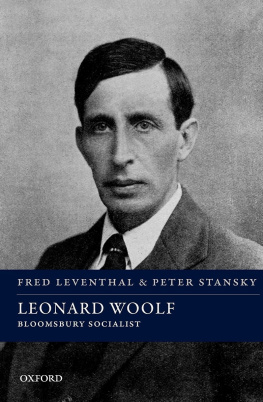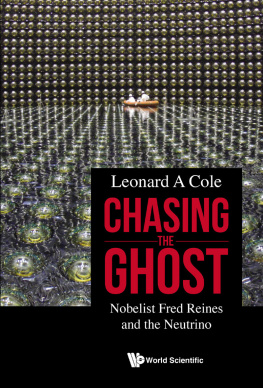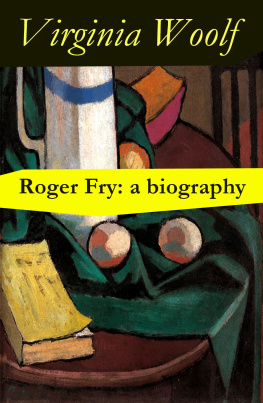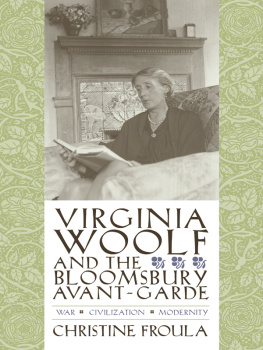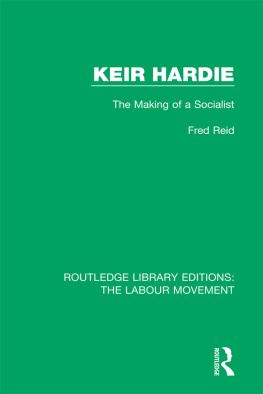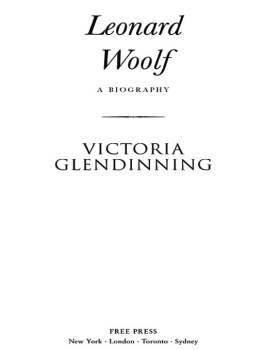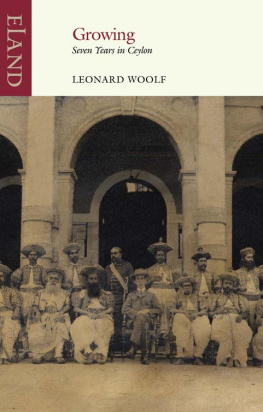Leventhal Fred - Leonard Woolf: Bloomsbury Socialist
Here you can read online Leventhal Fred - Leonard Woolf: Bloomsbury Socialist full text of the book (entire story) in english for free. Download pdf and epub, get meaning, cover and reviews about this ebook. year: 2019, publisher: OxfordUP, genre: Detective and thriller. Description of the work, (preface) as well as reviews are available. Best literature library LitArk.com created for fans of good reading and offers a wide selection of genres:
Romance novel
Science fiction
Adventure
Detective
Science
History
Home and family
Prose
Art
Politics
Computer
Non-fiction
Religion
Business
Children
Humor
Choose a favorite category and find really read worthwhile books. Enjoy immersion in the world of imagination, feel the emotions of the characters or learn something new for yourself, make an fascinating discovery.
- Book:Leonard Woolf: Bloomsbury Socialist
- Author:
- Publisher:OxfordUP
- Genre:
- Year:2019
- Rating:3 / 5
- Favourites:Add to favourites
- Your mark:
- 60
- 1
- 2
- 3
- 4
- 5
Leonard Woolf: Bloomsbury Socialist: summary, description and annotation
We offer to read an annotation, description, summary or preface (depends on what the author of the book "Leonard Woolf: Bloomsbury Socialist" wrote himself). If you haven't found the necessary information about the book — write in the comments, we will try to find it.
Leonard Woolf: Bloomsbury Socialist — read online for free the complete book (whole text) full work
Below is the text of the book, divided by pages. System saving the place of the last page read, allows you to conveniently read the book "Leonard Woolf: Bloomsbury Socialist" online for free, without having to search again every time where you left off. Put a bookmark, and you can go to the page where you finished reading at any time.
Font size:
Interval:
Bookmark:

General Editor
Timothy Larsen
General Editor
Timothy Larsen
The Spiritual Lives series features biographies of prominent men and women whose eminence is not primarily based on a specifically religious contribution. Each volume provides a general account of the figures life and thought, while giving special attention to his or her religious contexts, convictions, doubts, objections, ideas, and actions. Many leading politicians, writers, musicians, philosophers, and scientists have engaged deeply with religion in significant and resonant ways that have often been overlooked or underexplored. Some of the volumes will even focus on men and women who were lifelong unbelievers, attending to how they navigated and resisted religious questions, assumptions, and settings. The books in this series will therefore recast important figures in fresh and thought-provoking ways.
Titles in the series include:
Woodrow Wilson
Ruling Elder, Spiritual President
Barry Hankins
Christina Rossetti
Poetry, Ecology, Faith
Emma Mason
John Stuart Mill
A Secular Life
Timothy Larsen

Great Clarendon Street, Oxford, OX2 6DP, United Kingdom
Oxford University Press is a department of the University of Oxford. It furthers the Universitys objective of excellence in research, scholarship, and education by publishing worldwide. Oxford is a registered trade mark of Oxford University Press in the UK and in certain other countries
Fred Leventhal and Peter Stansky 2019
The moral rights of the authors have been asserted
First Edition published in 2019
Impression: 1
All rights reserved. No part of this publication may be reproduced, stored in a retrieval system, or transmitted, in any form or by any means, without the prior permission in writing of Oxford University Press, or as expressly permitted by law, by licence or under terms agreed with the appropriate reprographics rights organization. Enquiries concerning reproduction outside the scope of the above should be sent to the Rights Department, Oxford University Press, at the address above
You must not circulate this work in any other form and you must impose this same condition on any acquirer
Published in the United States of America by Oxford University Press
198 Madison Avenue, New York, NY 10016, United States of America
British Library Cataloguing in Publication Data
Data available
Library of Congress Control Number: 2019939510
ISBN 9780198814146
ebook ISBN 9780192543899
Printed and bound by CPI Group (UK) Ltd, Croydon, CR0 4YY
To Jean from both of us
The authors of this biographical study have shared an interest in Leonard Woolf for many years. They first met when Fred Leventhal was an undergraduate and Peter Stansky a graduate student, and they lived in the same Harvard House. They both received Ph.D. degrees in modern British history, having done so with the same splendid mentor, David Owen, and they have remained close friends ever since, even though they have lived miles apart on the opposite coasts of the United States since 1968. Over the years they have both approached Leonard Woolf from different perspectives. Fred has written studies of various political figures on the British left as well as several articles about Woolf, while Peter has been interested in Leonard as a member of the Bloomsbury Group. They were both privileged to have brief encounters with Woolf himself. It might be of interest to mention them here.
Peter met him in the summer of 1962. He and William Abrahams were just beginning a study of Woolfs nephew, Julian Bell, for their book Journey to the Frontier and went to see him in his tiny cold office, a cubicle off a passage at Chatto & Windus, the publishing house with which the Hogarth Press had become affiliated. He himself, with his white hair and skin, conveyed a sense of colorlessness increased by the fact that the room was skylighted, and all was bathed with a certain arctic light on a cold June day in London. His attitude towards Julian, his wifes beloved nephew, who had been killed in the Spanish Civil War, was characteristic. Clearly he cared for him, but was not about to abandon his critical sense. His view of Julians virtues and defects, although premised on the affection due to a nephew, was truthful and hard-headed. For the very reason that individuals were so important, the perception of them was not to be clouded by any false sentimentality. In effect, his conversation was like his autobiography: it gave the appearance of being discursive, but as it went on, each touch added up to a picture of Julian as he remembered him. The comments were put in what seemed to be an erratic way, much as a painter might daub on his color, but it was the best way for him to create a portrait. Having begun by saying he had little to say, he ended by saying a good deal. We were never to meet again, but we corresponded. His letters were succinct and to the point, and always sent in used envelopes, in what one imagined to be a sign of Gladstonian parsimony but may actually have come from the habit of saving paper during the Second World War. In these exchanges he revealed a keen editorial sense along with the shrewdness of a man of business. We had wanted to use extensive quotations from Virginia Woolfs then unpublished memoir of Julian; he allowed us to use only about half of what we had originally asked for. He was right, editorially, for he forced us to rely on our own words, and not on anothers, to gain the effect we wanted. Also, by limiting the amount of hitherto unpublished material by his wife to appear in print, he was, as he pointed out, protecting the economic value of her words. After Journey to the Frontier was published in 1966, he sent a warm, but brief note of praise, and listed a few, as is inevitable, errors. He also paid us the supreme compliment of praising the book in his autobiography, writing that he would not write much about Julian in it as we had provided a good account of his life. Our meeting was brief but supremely valuable, and I was lucky to have had the experience.
Fred met Woolf in August 1968 at the start of research for a biography of Henry Noel Brailsford, the journalist and writer on international relations, with whom Leonard had close ties in the world of weekly journalism and on the Labour Party Advisory Committees on International and Imperial Questions. He replaced Brailsford on the staff of the Nation in 1922 and worked with him on the New Statesman during Kingsley Martins editorship. Their attitudes were generally similar, although Woolfs antipathy to Soviet Russia emerged earlier than Brailsfords. Both were staunch advocates of Indian independence. An authors query for information on my part elicited an invitation to visit Leonard at Monks House on a summer afternoon. He cordially welcomed my wife and me, provided tea, and later accompanied us on a walk to the banks of the Ouse, where Virginia had drowned herself. He was forthcoming with recollections of Brailsford but failed to locate any correspondence. During our brief visit, Leonard, then nearly 88, seemed to go up and down the stairs with alacrity, looking in vain through some of his files. He promised to continue searching after our departure and corresponded only a few months before his death expressing regret that nothing further had been found. In July 1990, during a brief foray into Leonards papers and those of Kingsley Martin in the University of Sussex collections, I had the pleasure of spending an afternoon with Trekkie Parsons, who was helpful in illuminating Leonards political ideas and moral values, as well as providing the photograph that accompanied my essay on Leonard in the volume
Font size:
Interval:
Bookmark:
Similar books «Leonard Woolf: Bloomsbury Socialist»
Look at similar books to Leonard Woolf: Bloomsbury Socialist. We have selected literature similar in name and meaning in the hope of providing readers with more options to find new, interesting, not yet read works.
Discussion, reviews of the book Leonard Woolf: Bloomsbury Socialist and just readers' own opinions. Leave your comments, write what you think about the work, its meaning or the main characters. Specify what exactly you liked and what you didn't like, and why you think so.

